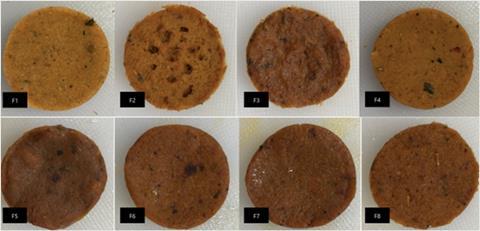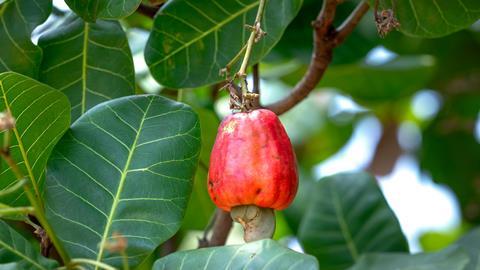Food products in the supermarket often leave a big trail of waste. This is certainly the case with the cashew nut. In ACS Food Science & Technology, researchers from Colombia have come up with a solution: plant-based burgers made from the cashew apple.
The price of cashews is always higher than you’d hope. This is true for many nuts, but in the case of cashews it is caused by the fact that up to 90% of the product is considered waste. That’s because the cashew apple, the false fruit of the cashew tree, is usually thrown away, despite the fact it is not only edible but also rich in nutrients. So María Hernández-Carrión and her colleagues at the Universidad de Los Andes in Bogota, Colombia, set out to find an alternative use for the cashew apple. The result: a new plant-based burger of a waste product.
To make the burger, the cashew apple is sliced and dehydrated to make a powder. A pea mixture is added as the protein source in the burger. They chose peas because of their high protein content and lower risk of allergic reactions compared to soy. Eight different recipes for the burgers were developed for testing.

The testing phase focused on formulation, processing and product structure of the burger. Particle size distribution proved to be an important parameter: different sizes of cashew apple powder resulted in differences in properties such as solubility or water absorption. The researchers also compared the burgers in terms of firmness, cut resistance, cooking loss and moisture retention.
The top four burgers were then tasted by fifty people. Burger moisture content was particularly important to the panel. Some burgers were too dry, others too moist. In the end, the research team chose a recipe based on burger 7, with added guar gum, a thickening agent, and potato starch to achieve the desired texture and moisture.
The result is a plant-based burger that the researchers say not only has the right texture and mouthfeel but also helps reduce food waste. By turning a residual stream into a valuable end product, the research is in line with the principles of the circular economy and contributes to the Sustainable Development Goals (SDGs). Whether it will also lead to lower prices for cashew nuts remains to be seen.
Source:
M. Hernández-Carrión, ACS Food Sci. Technol. (2025), Development of a Cashew Apple (Anacardium occidentale L.) Flour-Based Vegan Meat Substitute: A Sustainable Approach to Employ Cashew Harvest Residue













Nog geen opmerkingen